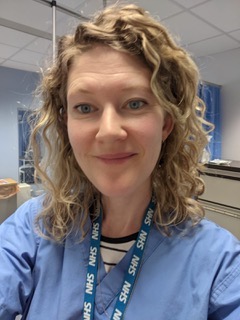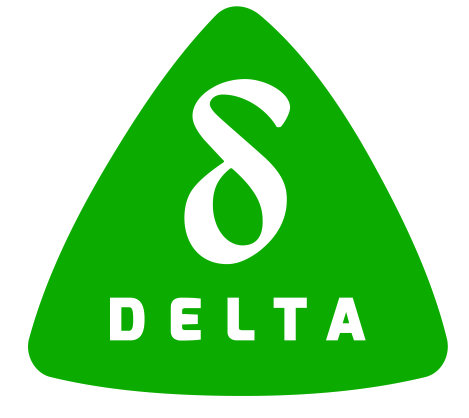Roz’s Story
As part of our 40th Birthday celebrations, we asked all of our young deaf adults, who undertook the Natural Aural Approach with their families with DELTA throughout their childhood, to give us their story and tell us what they are doing in 2021!
Our young deaf adults are our success stories of the Natural Aural Approach from DELTA, providing inspiration and support to families of newly diagnosed deaf children proving that deaf children can speak for themselves, naturally.
We have been delighted to hear from Roz White who shares her story.

Roz shares her story
I was born in 1988, before newborn hearing screening came in. I apparently babbled like a normal baby but then started to do these odd high-pitched shrieks. My mum would sneak up behind me and clap and I wouldn’t turn round. I finally had a hearing test at 10 months old which confirmed severe-profound deafness.
After their initial shock, my parents started asking around and fortunately heard of DELTA; I got hearing aids for my first birthday and went to a DELTA summer school at 18 months old (which I’m pretty sure is one of my earliest memories). I think the Summer School gave my parents confidence that they were doing the right thing by helping me to use my residual hearing as best as I could, and my early life involved lots of chatting especially with grandma and grandad; life was constantly narrated. I do remember the odd occasion where I would turn my hearing aids off to be cheeky!
We later found out that the cause of my deafness is a mutation on the Connexin 26 gene; this is passed down by autosomal recessive inheritance i.e. there is a 1 in 4 chance of two carriers having a deaf child – as it happens I turned out to be the only deaf one of my parents’ four kids, a fact I now regret not milking more.
I went to primary school armed with my Sennheiser radio hearing aid (my dad had trained me to use this by having a radio-aided chocolate treasure hunt in the garden. Excellent motivation.) This was a great bit of kit and lasted me all the way through to sixth form. My parents did a lot of preparation with my teachers both in primary and secondary school, and everyone was very supportive.
My experience of school was great, and my friends were all lovely and fantastic at repeating themselves. I did find a day of lipreading hard work and there was always some adjusting to do whenever things changed e.g. GCSEs to A levels, though I got used to these changes fairly quickly.
I decided after watching Holby City aged 14 that I wanted to do medicine. (I am still devastated that Infection Control got rid of the white coats before I actually qualified as a doctor; I wanted to see how they flapped when running around corners.) I got the GCSEs and A levels required and went up north to Newcastle to study. In medical school I had a note-taker who is still a friend now – we think she should be an honorary doctor for sitting through 5 years of my lectures! I used my Disabled Students Allowance to fund a new radio hearing aid for lectures, a laptop and an adapted stethoscope. I got lots of support from UKHPHL then and later in my career.
I graduated and went straight into my Foundation doctor training – I’d picked a hospital that I knew had an on-call system which worked via an app. We had to work out a way for me to respond to crash calls – I used to have to be bleeped 0000 for emergencies, then find someone with ears to call switchboard back and find out where to run to. Or if it was a true crash call I’d get someone to listen to where the bleep was squawking to go and then start running!
I was never very comfortable with busy resus situations which is probably why I went for General Practice in the end – it’s one to one in a quiet room with one or two people (normally).
In 2015, halfway through my GP training, I decided to be assessed for a cochlear implant at last, to see if I could rely on lipreading a bit less. It was a great decision and I am so happy with it. I’ve written about that on my blog: http://yumroz.blogspot.com/2015/06/ermahgerd-swertch-ern.html
I now wear a cochlear implant in my left ear and a Phonak Nathos in my right – the sound seems to blend together very well for me.
I qualified as a GP in 2019 and now work in a busy city centre practice. I can’t use the phone for work but I have lots of supportive colleagues who are happy to do phone calls for me if required. I’ve never had problems communicating with patients – I always explain my hearing loss at the start of the consultation so that they know, and then we just crack on. Covid has made things a bit more complicated with masks etc but now we have a system where my patients wear a mask to come in, sit behind a screen with a visor and remove their mask while we chat, then put the mask back on for examination.
For listening to chests, I use a Thinklabs One stethoscope which is brilliant. I link it to my implant and hearing aid via T-loop ear hooks which works really well.
In many ways, working remotely has been more deaf-friendly as we now have software for texting patients – I can have an SMS chat back and forth with someone about e.g. their acne medication. Since I returned to work (after a well-timed maternity leave spanning all of 2020), e-consults have formed the bulk of my work. I still miss seeing babies and little kids face to face though! Video consultations are a possibility but it really depends on how good the picture is for lipreading, so I haven’t used these routinely for clinical work yet.
I found a husband who was easy to lipread (not the only reason I picked him, I hasten to add!) and we now have two lovely children aged three and one. My poor husband has had to do the hearing overnight as I sleep with my implant/hearing aid off (being able to hear my own breathing keeps me awake!) but thankfully they have both kindly decided to let us sleep a bit more these days…
I have been to a few Summer Schools as a volunteer which were great fun; I have also run a couple of Great North Runs for DELTA (I fear the London Marathon is far beyond my capabilities.) I feel so grateful to my parents and to DELTA for my very aural start in life; I think it has enabled me to fulfil my potential and find a very enjoyable and challenging job.
Donate to DELTA
If you have liked reading Roz’s story, please consider giving a donation to DELTA to continue their work in supporting families of deaf children across the UK to enable their children to speak for themselves, naturally.
Read more DELTA Stories
We provide stories from more young deaf adults from across the UK and also from parents and professionals sharing their experiences of going through the Natural Aural Approach.
Become a member of DELTA
By becoming a member, you will be declaring your belief in what DELTA stands for and aligning yourself with the leading charity promoting the highest standards of oral education for deaf children in the UK.
